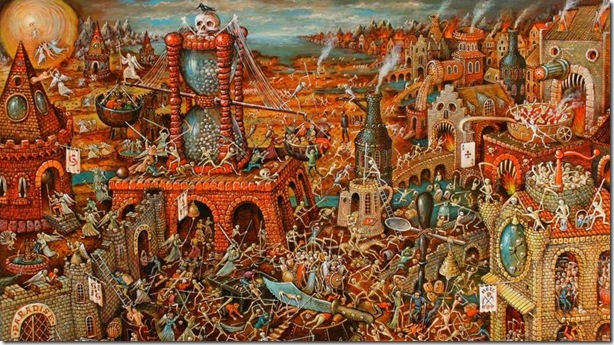Articles addressing Rob Bell’s book, Love Wins, are legion (they also tend to be long, such as Kevin DeYoung’s insightful review). We probably don’t need another post; yet, there is one misnomer worthy of correction—the correlation of Bell’s view of God’s postmortem love and the Catholic doctrine of purgatory.
Maybe you have heard someone equate Bell’s view of the afterlife with the Catholic doctrine of purgatory since both envisage the souls of men and women suffering in flames before they are eventually cleansed and redeemed. I would like to put this notion to rest by showing how Catholic teaching is entirely different than what Pastor Bell appears to be saying. This is not to defend or endorse the Catholic position, but to simply help us understand where important lines of distinction fall.
The Catholic Church insists that it is those who die in friendship with God, the justified, those in a state of grace who go to purgatory, not those who have died outside of Christ. In the words of the Catechism:
1030 All who die in God’s grace and friendship, but still imperfectly purified, are indeed assured of their eternal salvation; but after death they undergo purification, so as to achieve the holiness necessary to enter the joy of heaven.
1031 The Church gives the name Purgatory to this final purification of the elect, which is entirely different from the punishment of the damned. The Church formulated her doctrine of faith on Purgatory especially at the Councils of Florence and Trent. The tradition of the Church, by reference to certain texts of Scripture, speaks of a cleansing fire:
- As for certain lesser faults, we must believe that, before the Final Judgment, there is a purifying fire. He who is truth says that whoever utters blasphemy against the Holy Spirit will be pardoned neither in this age nor in the age to come. From this sentence we understand that certain offenses can be forgiven in this age, but certain others in the age to come.
As for the doctrine of hell, the Catechism teaches the eternal duration of those who are separated from God:
1035 The teaching of the Church affirms the existence of hell and its eternity. Immediately after death the souls of those who die in a state of mortal sin descend into hell, where they suffer the punishments of hell, "eternal fire." The chief punishment of hell is eternal separation from God, in whom alone man can possess the life and happiness for which he was created and for which he longs.
The reality of eternal judgment should sober our hearts, drive us to our knees in prayer, and compel us to proclaim the gospel with passion and fidelity as though lives depend on it, because they do.





